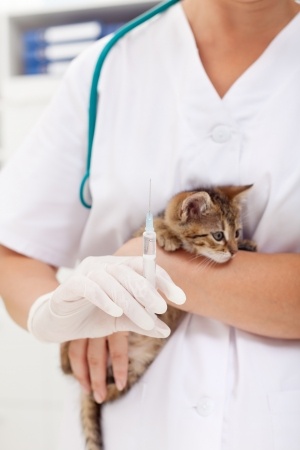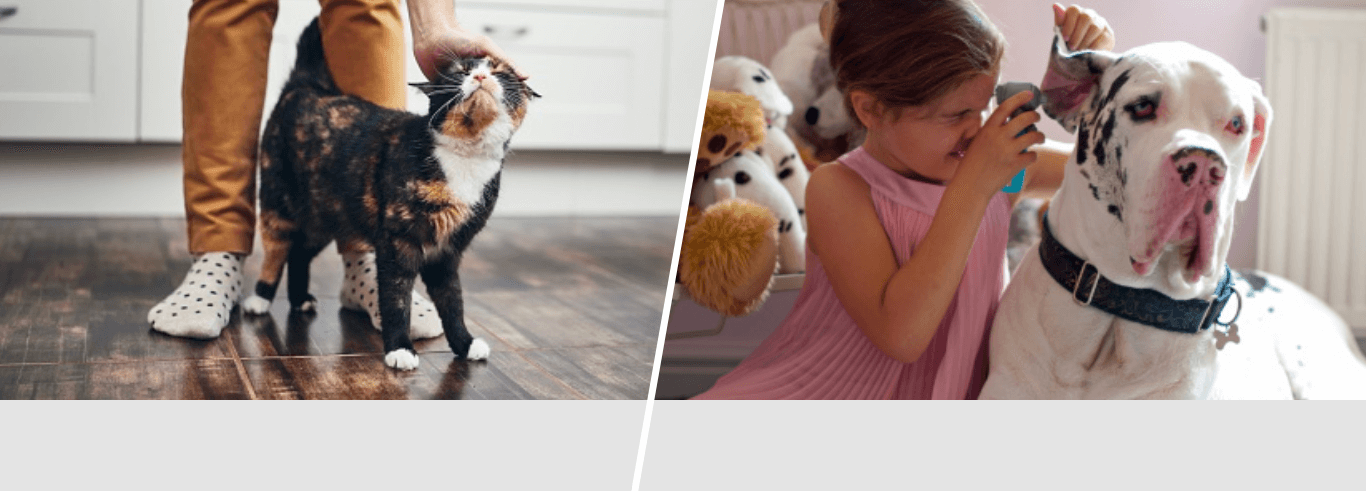The first 12 weeks of owning a cat
So, you have decided that a cat is the pet for you! You have collected your kitten from the breeder or rescue centre and you are quickly discovering that kittens are natural bundles of fun and entertainment.
Welcome to the world of cats and the start of becoming a cat lover for life!
However, as with all pets there are a few things that you need to know…
Veterinary care for your kitten
Kittens need an initial course of two injections, 3-4 weeks apart and thereafter a yearly booster for continued protection. The vaccination injections protect against feline flu, feline enteritis and feline leukaemia.
It is important that you find out the exact vaccination status of your new kitten before you take them home by asking for a certificate from the breeder or rescue centre. Certificates are required by catteries so it’s important to obtain them and keep them in your records. Do not let your kitten outdoors (even into the garden) until the vaccination course is complete as stray cats can enter even the most secure garden and spread infection.
Even if all the injections have been carried out you should still register your kitten with a vet. Kittens need regular worming and flea treatment, which your vet will be happy to discuss. Parasite control regimes vary, but should deliver protection against tapeworms and roundworms, as well as fleas and ticks. So talk to your veterinary surgeon to find the right protocol for your kitten. You may wish for your cat to be neutered and this is undertaken by a vet at about 5-6 months.
It’s highly recommend that you have your cat microchipped, especially if it is an outdoor cat, but ensure your details are registered with a good database such as Petlog. Remember to keep these details up to date with any changes of address or telephone numbers and keep the microchip number handy in case your cat does ever go missing.
Kitten insurance
You should consider insuring the new member of your family to avoid the surprise of hefty vet bills. It’s also worth noting that expensive problems generally peak in the very young or older cats, so it may well be worthwhile considering cat insurance early on. Some insurers, including Argos Pet Insurance, cover kittens from 8 weeks old.
Look in detail at what is covered, the limits and exclusions before making your final choice. Like everything else, the cheapest is not necessarily the best value for money.
Diet for your new kitten
It’s a good idea to continue feeding your kitten the same food as the breeder or rescue centre for at least the first few weeks. Kittens can have very sensitive tummies when subjected to changes like a sudden change of food and a new environment.
In general, it’s recommended to use a good quality dried food aimed specifically at kittens. Dried food helps to avoid tartar build up on the teeth of adult cats, thus helping to save extensive dentistry work in the long term. Dried food can easily be bought in bulk and comes in a wide range to match all stages of life. It’s important to remember to provide plenty of fresh water alongside dried food. The type of cat food fed is often the owner’s personal preference and some people prefer the variety that wet food provides.
The key point to remember is make any changes to diet gradually with kittens – whatever you feed – to avoid tummy upsets.
Kittens have very small stomachs, so feeding little and often in these early weeks is a good idea, ideally 4 small meals a day. If you wish to provide your kitten with milk, then use the special cat milk that you can buy. Do not feed cow’s milk, as this is not well tolerated by cats and will often cause diarrhoea.
If the kitten does not eat or develops vomiting and diarrhoea, contact your vetfone helpline or your veterinary surgeon for advice as soon as possible, kittens can become very weak, very quickly.
Toilet training your kitten
Kittens are very clean and quickly understand litter training. In general, no toilet training by the new owner is required, because the kitten’s mother has done that already; they are often toilet trained before being fully weaned.
Ensure you provide a decent sized litter tray containing good quality cat litter. Remember that the kitten may struggle to actually climb into the tray if it has high sides! So, perhaps start small and upgrade as your kitten grows.
Most kittens need to use the litter tray after they have eaten and drunk; so once they have finished a meal gently pick them up and place them into the litter tray. After a few minutes scrabble around the litter with your hand (make sure you wear gloves) – whilst this may seem slightly odd to any watching friends or family, it quickly attracts the kitten’s attention and encourages the kitten to use the tray. Kittens like to bury their waste and the scrabbling noise of the litter seems to help associate the litter tray with passing urine or faeces.
There are different types of litters and adult cats often have a preference for one type. This selectivity may start at an early age, so if the kitten is struggling with the litter tray, then try to find out what they were using before.
Even if you plan for your kitten to toilet outside once he or she is older, it is still important to litter tray train them in case there are times when a litter tray is necessary e.g. a medical need which might keep them indoors.
It is important to stay patient – never reprimand or shout at any animal for toileting in an inappropriate area. Positive reinforcement is always the better option.
Grooming your kitten
It is a good idea to gently brush your kitten every day. Cats and kittens love to be stroked and groomed; brushing feels very good to them and is a positive way for you to bond. In the case of long haired cats, daily brushing is essential to keep their coats from becoming knotted and matted.
Daily handling of your kitten is also important to make them relaxed when being handled e.g. by the vet when they receive their yearly boosters and check-ups. It also allows you to spot any problems early e.g. gunky eyes, ears, lumps etc. that may benefit from being dealt with promptly.
Socialisation
The secret to a happy, well-adjusted and friendly adult cat is socialisation as a kitten. Meeting lots of different people and being used to being stroked is important, as is becoming used to a visit to the vet.
People may also be introducing a kitten to a house with an adult cat – here we would advise that the adult cat has its nails clipped and they are supervised together until a bond is formed or the kitten is older. It may take a few days for the new kitten to be accepted by the older cat. Despite everything you do some cats will only ever tolerate each other at best.
Entertaining your cat
Kittens are naturally very playful and are masters at turning everyday items into exciting toys, ready for play. However, in the absences of entertaining alternatives, these may well include your curtains and furniture!
Specially designed cat and kitten toys are always good fun, but most kittens will also love empty cardboard boxes and anything shiny that catches their eye. You can make your own cat and kitten toys with the inner tube of toilet tissue rolls or by hanging up old unused CDs with a piece of string which they love to chase and pat with their paws. All cats love to squeeze into tight spaces for somewhere secure and cosy to snooze, so be aware that kittens will often wedge and wriggle themselves into surprisingly small gaps, such as under sofas.
Kittens also love to flex their claws and scratch at things, this is a natural action which sharpens the nails. Provide a good quality sisal rope scratching post, many come with toys swinging from them and be prepared to place a few around to help prevent unwanted scratching of furniture and curtains.
Top tip
Try placing an old door mat beside furniture or stair carpets that your kitten has taken a liking to scratching as this often encourages them to use the door mat instead.
Remember, never shout at or try to discipline your kitten in any way, but rather distract them instead with something to grab their attention and stop them from continuing with any unwanted behaviour.
Kittens are wonderful fun pets and the groundwork you put into these early stages will establish a loving rewarding relationship with your adult cat for many years to come.
While you’re enjoying your first few months with your new cat, it’s important to remember to protect your cat with Argos Pet Insurance provided by Pinnacle Insurance Ltd. Explore our cat insurance policies today.
 Sorry, our lines are now closed
Sorry, our lines are now closed






